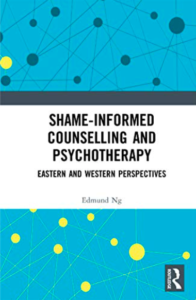Book: Shame-informed Counselling and Psychotherapy
Dr. Edmund Ng is the founding president of the Asian Christian Counselors Association. This post stems from his new book Shame-informed Counselling and Psychotherapy: Eastern and Western Perspectives (Routledge, 2020).
 Whether it is in people-helping or mission outreach, I firmly believe that we need to develop a deeper theological and theoretical understanding of the Christian faith so that we are culturally-sensitive and contextually-relevant in meeting the local needs. In particular, as an Asian living most of my life in where the theme of honor-shame is prominent, I fully subscribe to the contention that the sin-guilt-forgiveness legal format of the Gospel does not resonate readily in meeting our innermost aspirations and inadequacies. Jesus came to die for both our sin and shame, but shame, as Robin Stockitt (2012) puts it, is indeed “the orphan of Western theology” (p. 9).
Whether it is in people-helping or mission outreach, I firmly believe that we need to develop a deeper theological and theoretical understanding of the Christian faith so that we are culturally-sensitive and contextually-relevant in meeting the local needs. In particular, as an Asian living most of my life in where the theme of honor-shame is prominent, I fully subscribe to the contention that the sin-guilt-forgiveness legal format of the Gospel does not resonate readily in meeting our innermost aspirations and inadequacies. Jesus came to die for both our sin and shame, but shame, as Robin Stockitt (2012) puts it, is indeed “the orphan of Western theology” (p. 9).
Recent advancements in modern psychology and neuroscience in the scientific study of human nature have helped us to better understand the central role of shame within the family of our emotions. Shame is called “the master emotion of everyday life” (Scheff, 2003, p. 239). Researchers have now provided us with vast empirical evidences linking shame as the root emotion that causes many of our psychological problems. Kaufman (1996) rightly emphasized that “shame is the principal impediment in all relationships” (p. 7) and that if we are to understand and eventually heal what ails the self, we must first consider the effects of shame. Indeed, only the word “shame” and not “guilt” is explicitly mentioned in the narrative of the creation and fall of mankind in Gen 1-3. Hence, I believe that if there is a principal emotion which must first be addressed in the redemption and sanctification process of our fallen humanity, it is our shame.
Yet, for several reasons, both the Church and the world have an extensive aversion to the centrality of shame among our emotions and depriving it of the serious attention that it merits. But to develop a deeper and contextualized theology on shame, we must start with a better theoretical understanding of the subject matter itself to come within grasp of the inadequacy of addressing it through scientific and humanistic interventions. To put it differently, although the Bible covers comprehensively all aspects of life, including our human functioning and dys-functioning, the Scriptures are not exhaustive or explicit in all situations. This is where the knowledge and techniques of modern psychology, being a science and mostly supported by research, can fill in the contextual gaps of cognition, emotions and behavior so that we can understand and address human nature better when applying the Scriptures.
Nevertheless, Western literature on shame is not only limited but has mostly associated this emotion as being harmful or even pathological to a person’s wellbeing. For this reason, I have written a more culturally-inclusive psychological book on shame, Shame-informed Counseling and Psychotherapy: Eastern and Western Perspectives.

It is very interesting that mostly our understanding of shame is limited to pathological shame. If and I believe it is a most powerful emotion to not use the concept as a tool is a weakness. One counselling skill is the use of clarification so being able to differentiate between guilt and shame is very positive. Seeing shame is its various nuances and contexts is also an atout to the clinical toolbox!